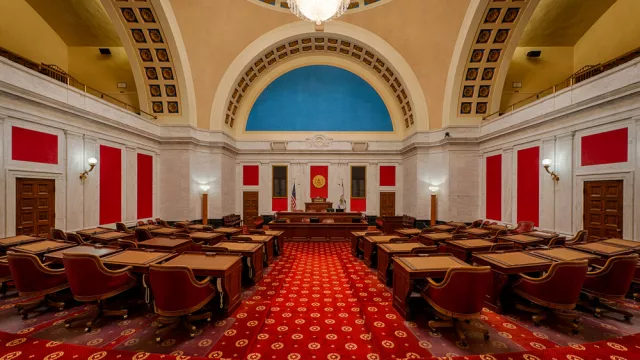Table of Contents
A step in the right direction: West Virginia Governor signs ‘New Voices’ bill into law

Shutterstock.com
Last week, West Virginia Gov. Jim Justice signed the Student Journalism and Press Freedom Protection Act into law, granting statutory protections to student journalists in public K-12 schools and public institutions of higher education.
The bill, sponsored by Sen. Mike Azinger and based on the Student Press Law Center’s New Voices model bill, passed with bipartisan support. West Virginia joins 17 other states in adopting New Voices legislation.
Given FIRE’s ongoing efforts through the Student Press Freedom Initiative to defend and protect student journalists across the country, we’ve written in support of similar bills in the past. However, while this is a step in the right direction for legislative efforts in West Virginia, the bill still contains a problematic provision that could have a negative impact on student press freedom.
Last month, when the bill first passed the Senate, FIRE objected to language in the bill that denied protection to speech “vulgar or offensive to a reasonable person”— both of which encompass protected expression. Although the provision has been slightly revised to exclude speech considered “offensive to a reasonable person” from the list of unauthorized expression, the new law still specifically does not “protect expression by a student” that is “obscene, vulgar, pornographic, or of sensual or illicit sexual content.”
By exempting “vulgar … or of sensual or illicit sexual content” from protection, the new law may be used by college administrators to punish a student for speech that is protected by the First Amendment.
Hopefully, West Virginia lawmakers will revise the bill’s language next year to fix this unfortunate problem in an otherwise excellent piece of legislation.
The extent to which the First Amendment protects students from prior review and censorship by administrators is different in high school than it is in college.
In Bethel School District v. Fraser, the Supreme Court upheld the suspension of Matthew Fraser, a high school student who engaged in what the court described as an “elaborate, graphic, and explicit sexual metaphor” while nominating a fellow classmate for student vice president in front of a student assembly. Writing the majority opinion on the case, Chief Justice Warren Burger argued that it is a “highly appropriate function” of public school K-12 administrators to subject students to prior review and censorship for the use of “vulgar and offensive terms in public discourse.”
However, such speech is clearly protected at the college level unless it meets one of the few, narrow exceptions to the First Amendment. In 1969, graduate student Barbara Papish was expelled for distributing on campus a newspaper containing content many considered indecent: a front cover with a political cartoon of police officers sexually assaulting the Statue of Liberty and the Goddess of Justice, and an article with the headline “Motherfucker Acquitted.” Her case made it to the Supreme Court, which held that “the mere dissemination of ideas — no matter how offensive to good taste — on a state university campus may not be shut off in the name alone of ‘conventions of decency.’”

‘New Voices’ bill advances in West Virginia, Student Press Law Center calls for amendment
West Virginia state senators unanimously voted to pass Senate Bill 121, providing for the creation of the Student Journalist Press Freedom Protection Act. The bill is now in the House of Delegates for consideration.
Thus, by protecting less speech than the First Amendment, this West Virginia law mistakenly — and unconstitutionally — implies that administrators may censor collegiate student journalists “vulgar … or of sensual or illicit sexual content.” For example, college administrators could interpret the law to say that they are allowed to censor a political cartoon that lampoons sexuality or student reporting on a drag performance happening on campus.
FIRE is grateful that this law adopts New Voices protections to ensure that school-sponsored media remain free from administrative control or prior review in most cases. However, by protecting less speech than the First Amendment jurisprudence protects, at least in the higher education context, the bill has the potential to make administrators feel empowered to interfere with college student journalists’ freedom to write and investigate without fear of censorship or punishment.
Hopefully, West Virginia lawmakers will revise the bill’s language next year to fix this unfortunate problem in an otherwise excellent piece of legislation.
Recent Articles
Get the latest free speech news and analysis from FIRE.

Free speech in Trump 2.0
Podcast

The Federal Bureau of Investigation (of protected speech)

The paper was her lifeboat — UMD called it interference


